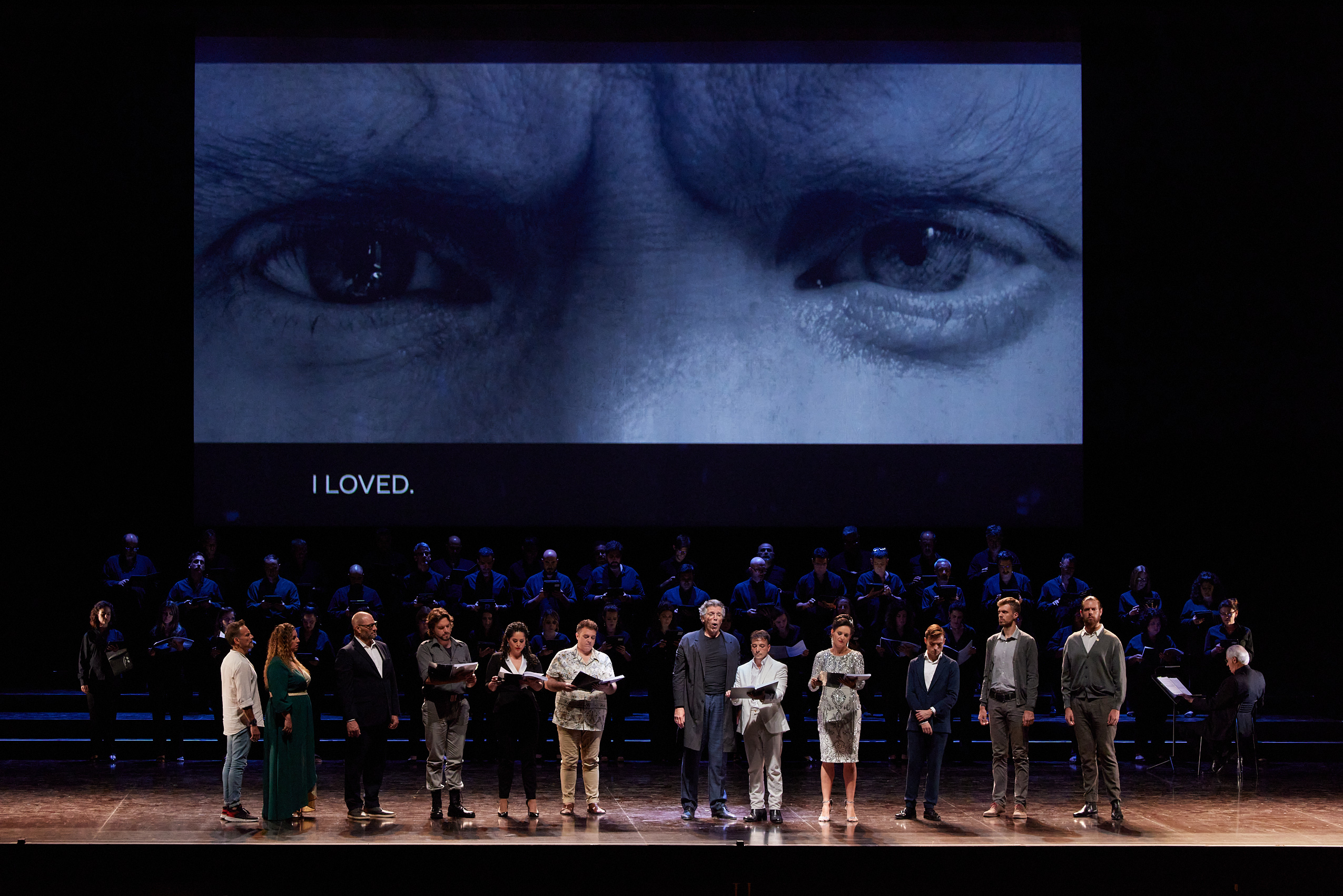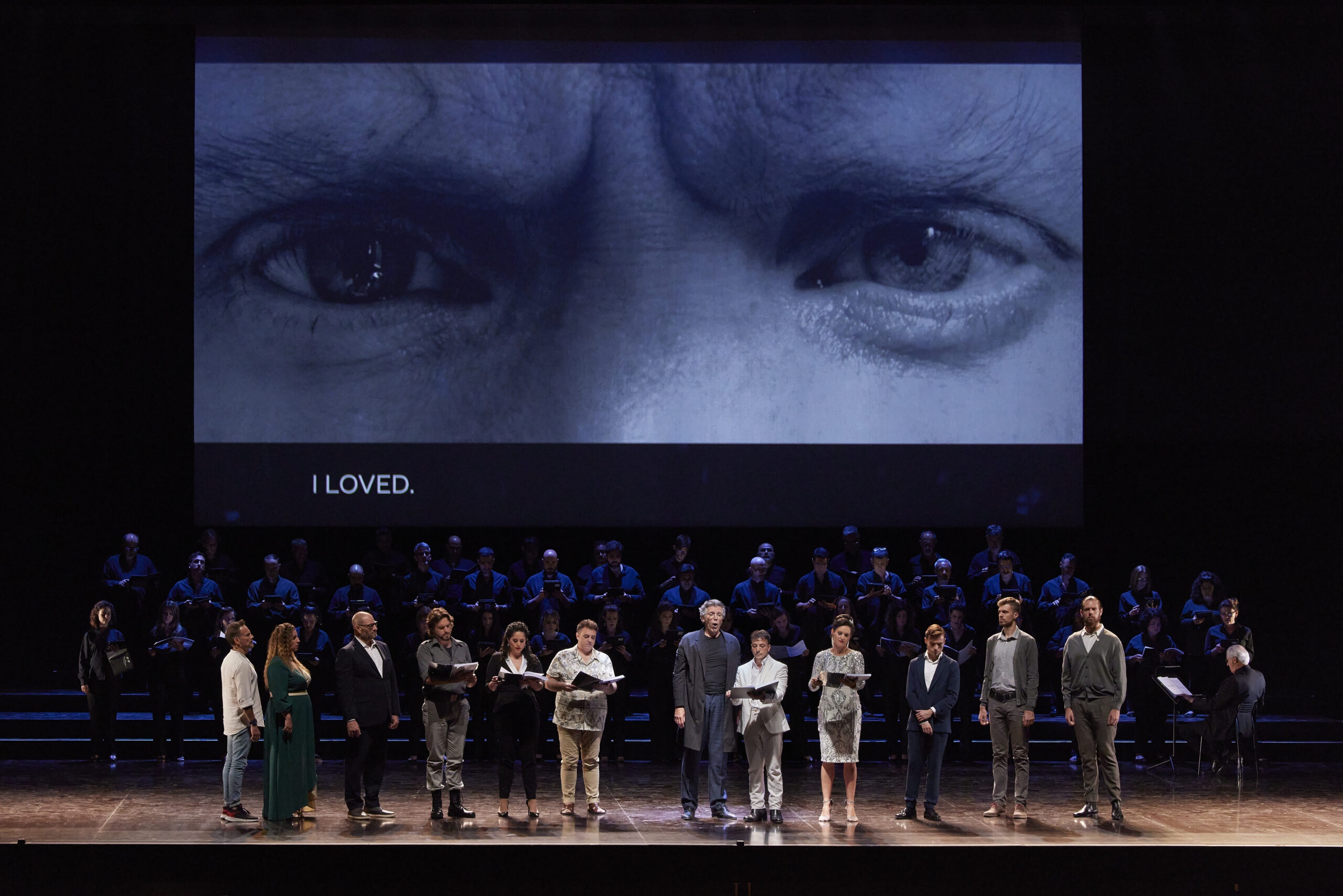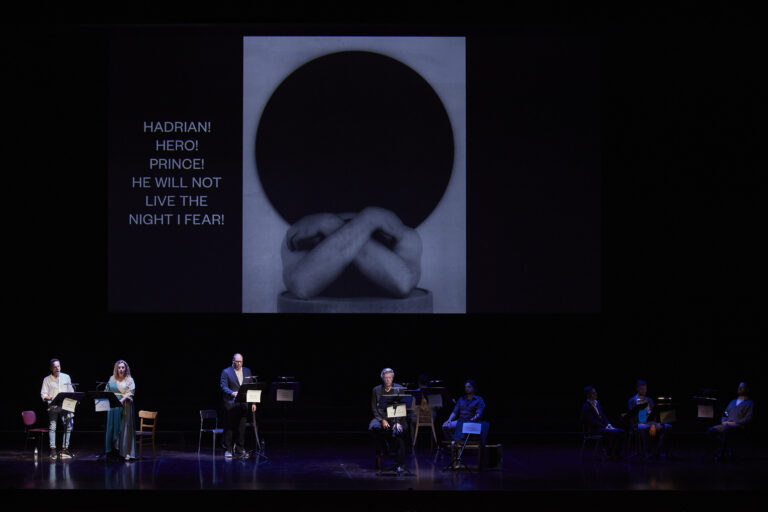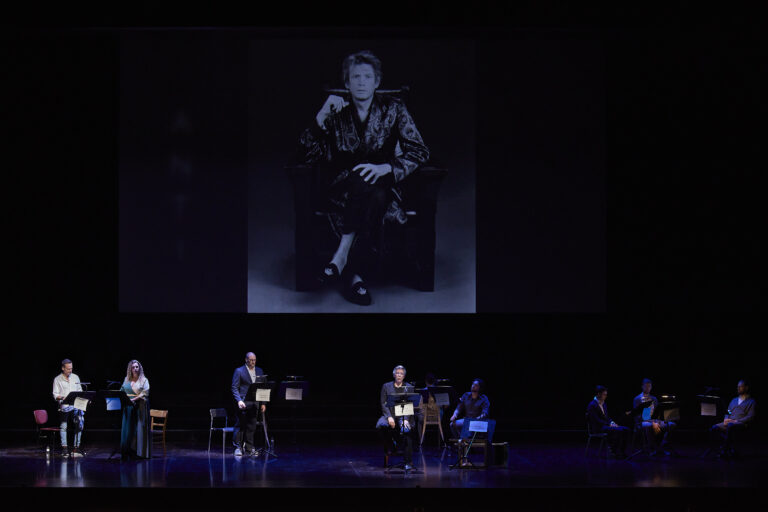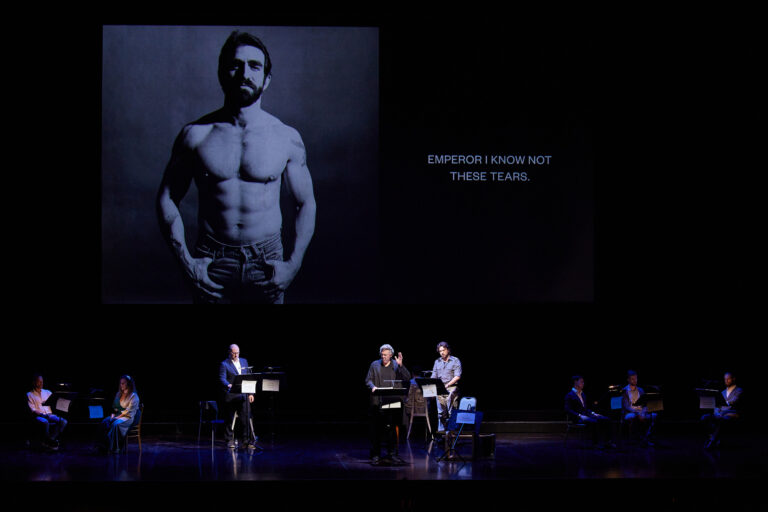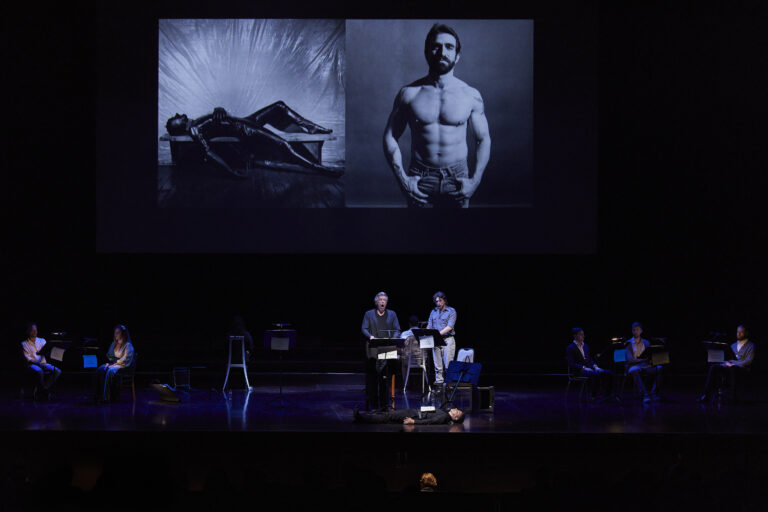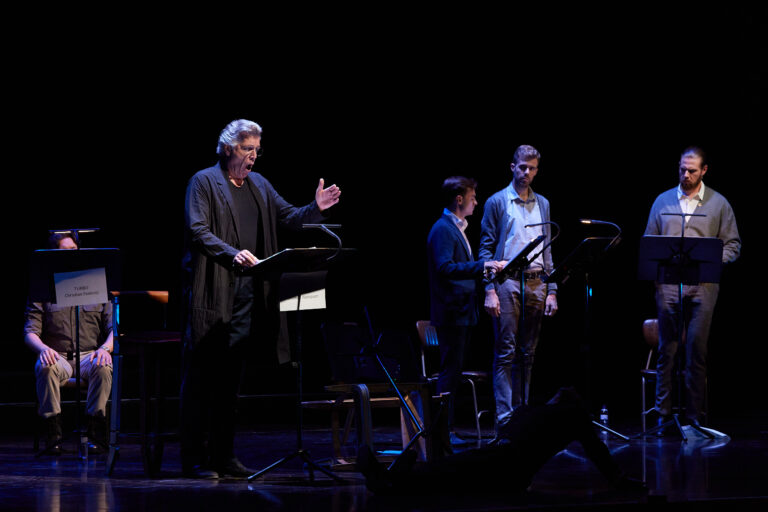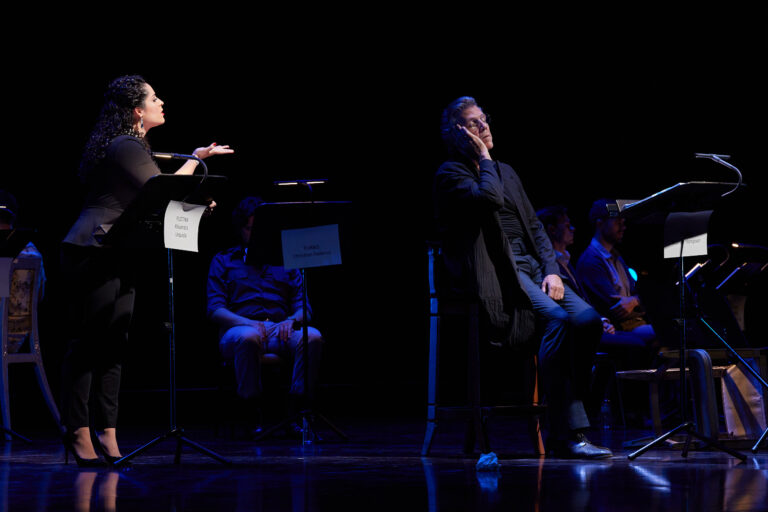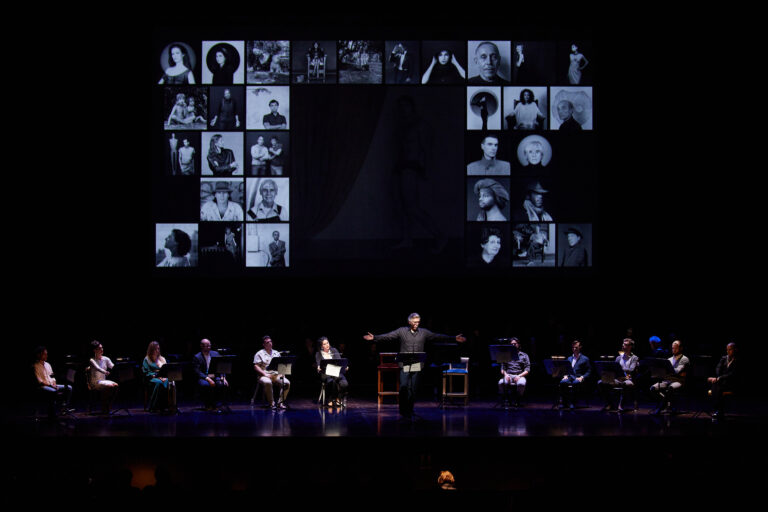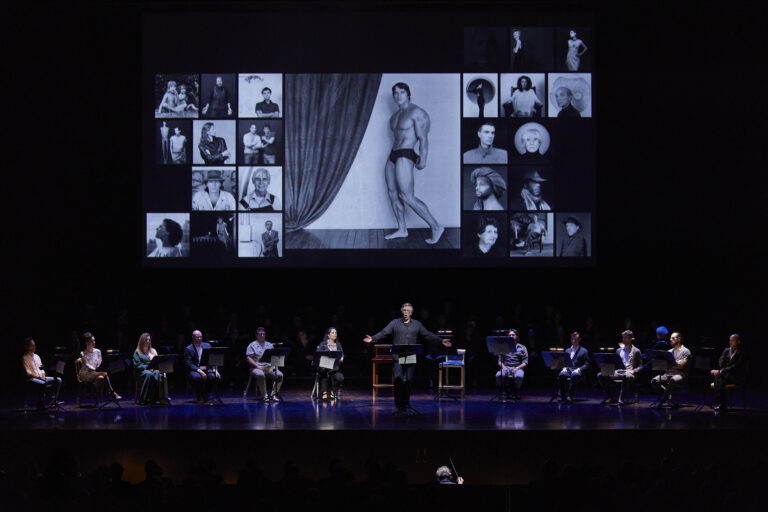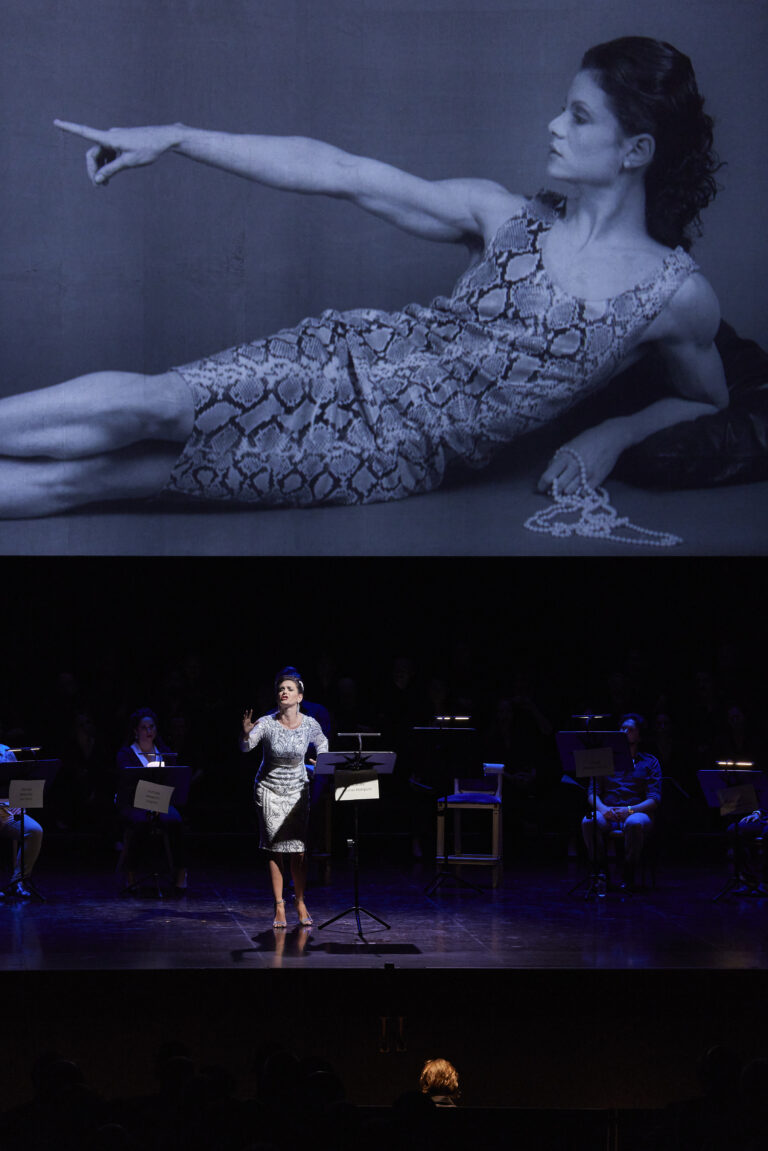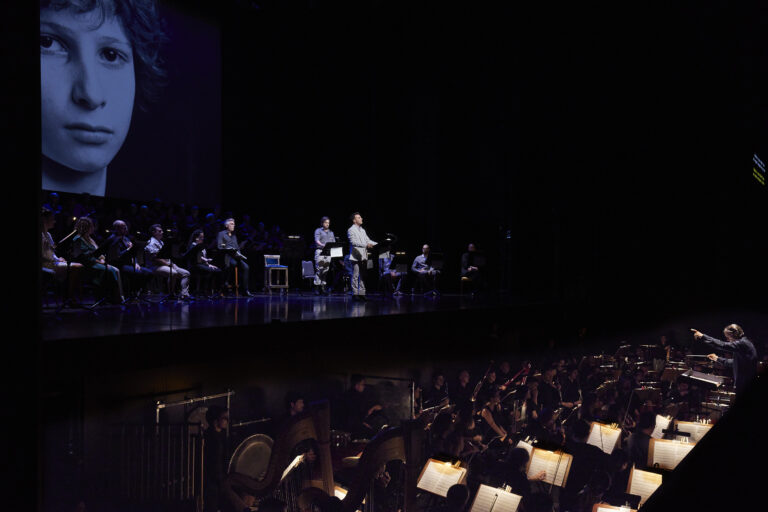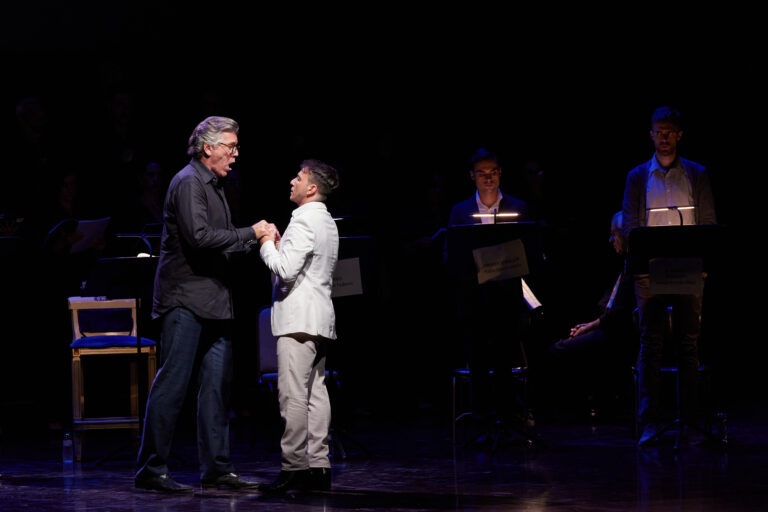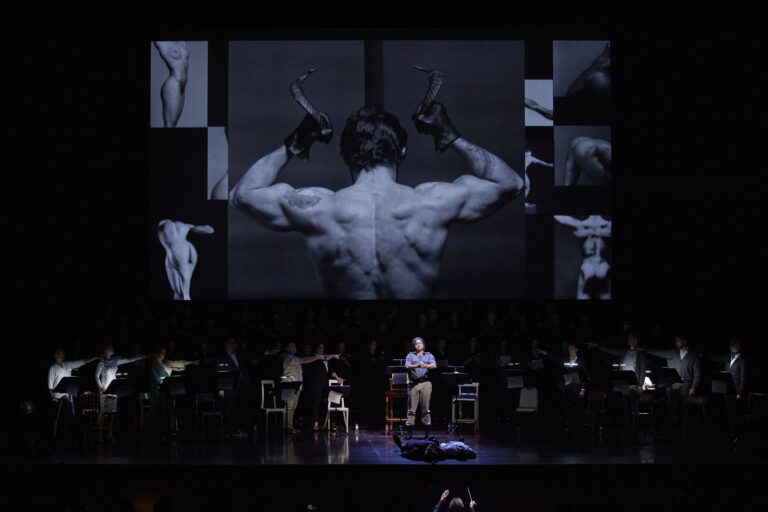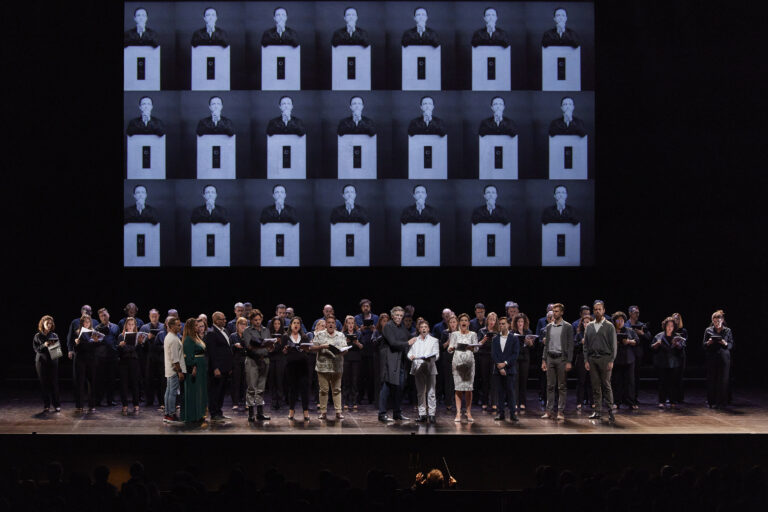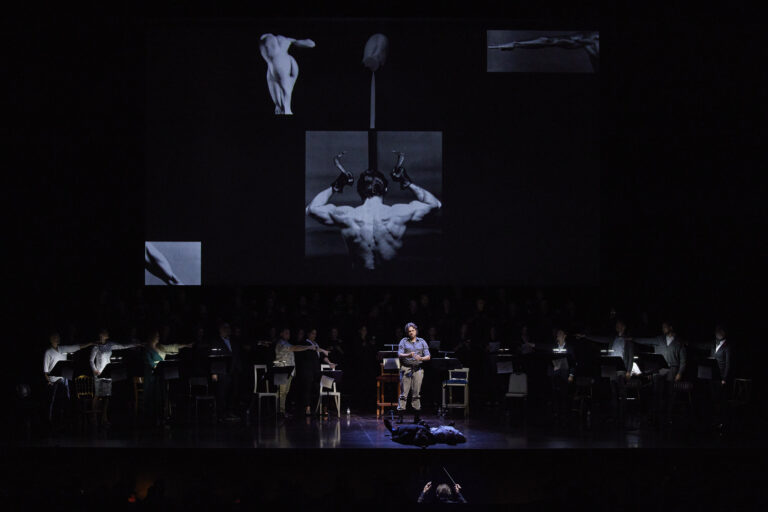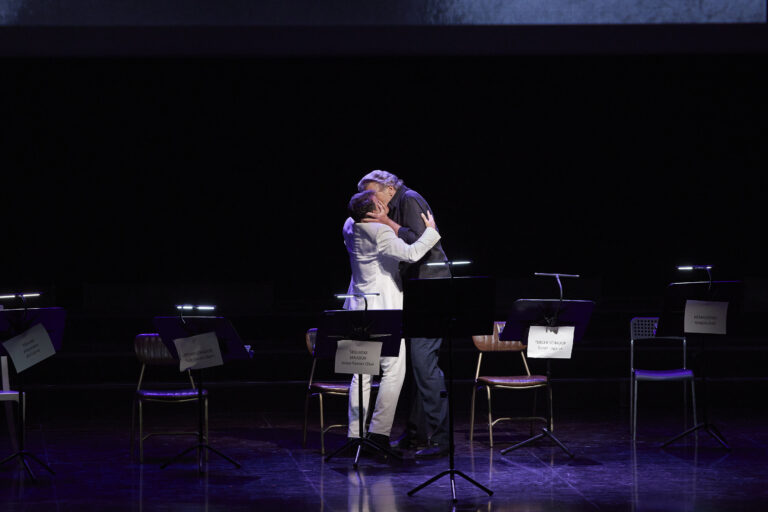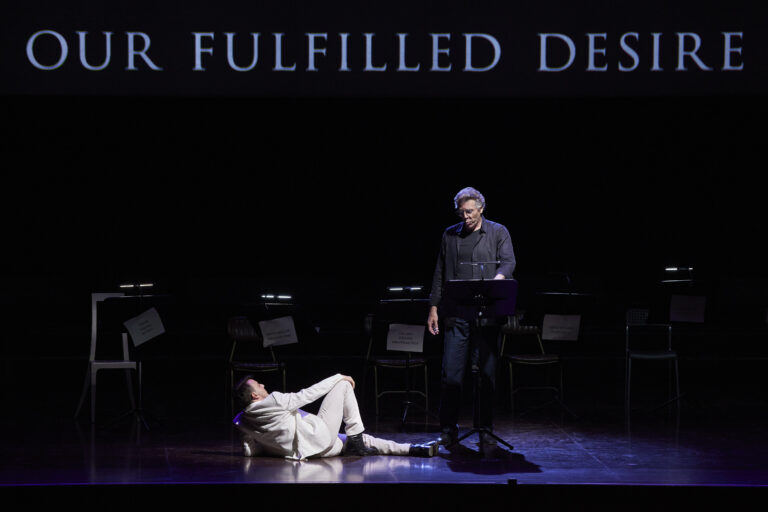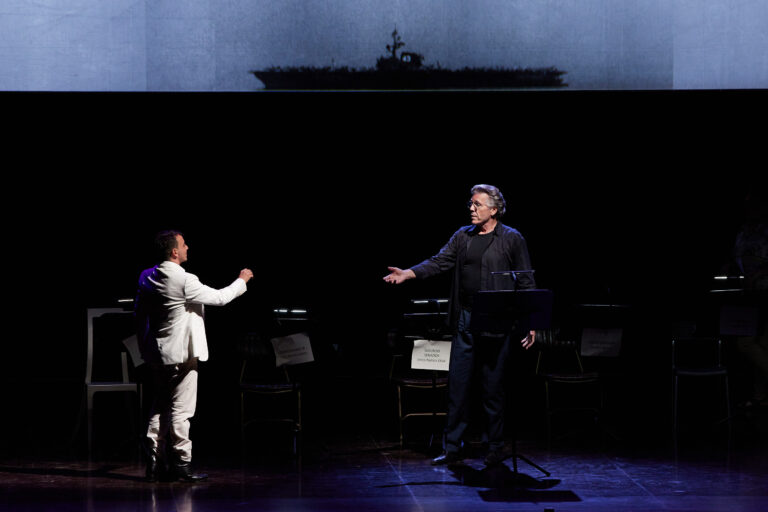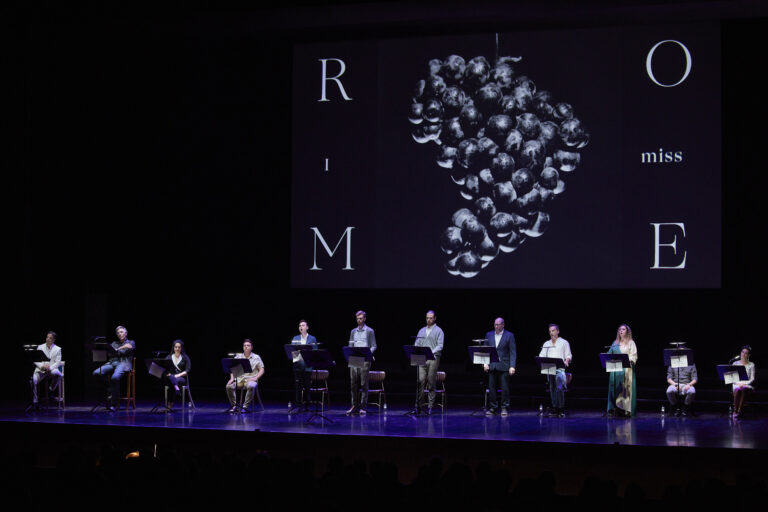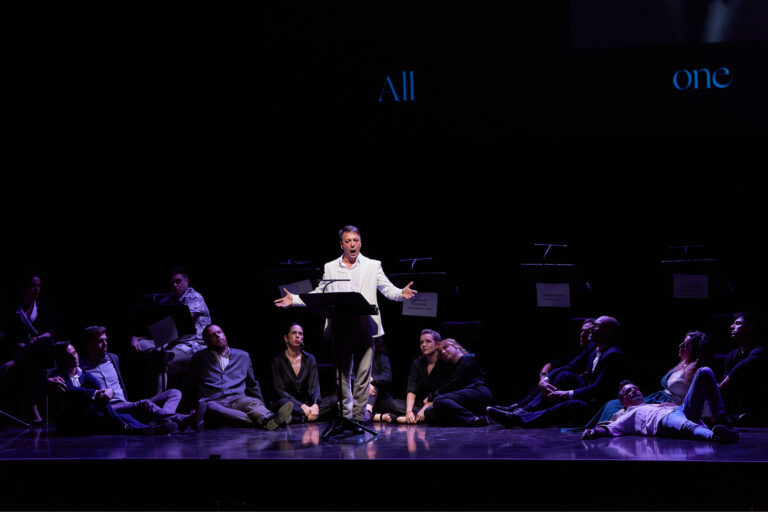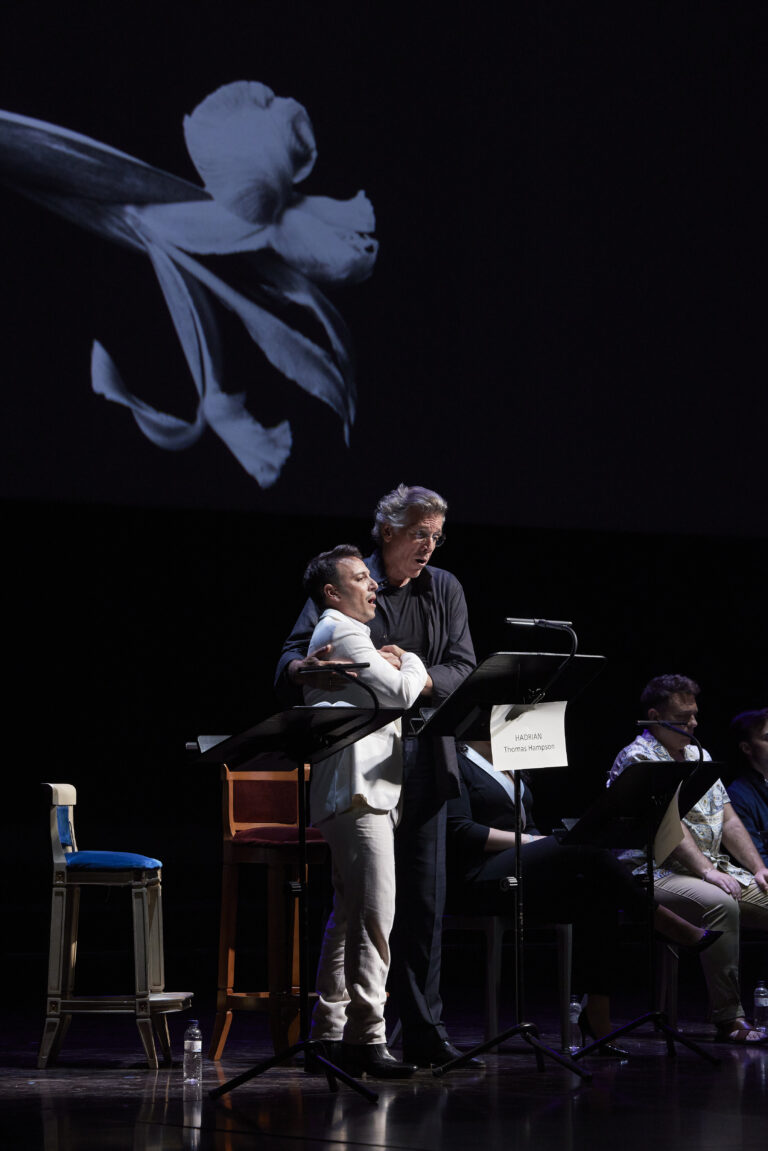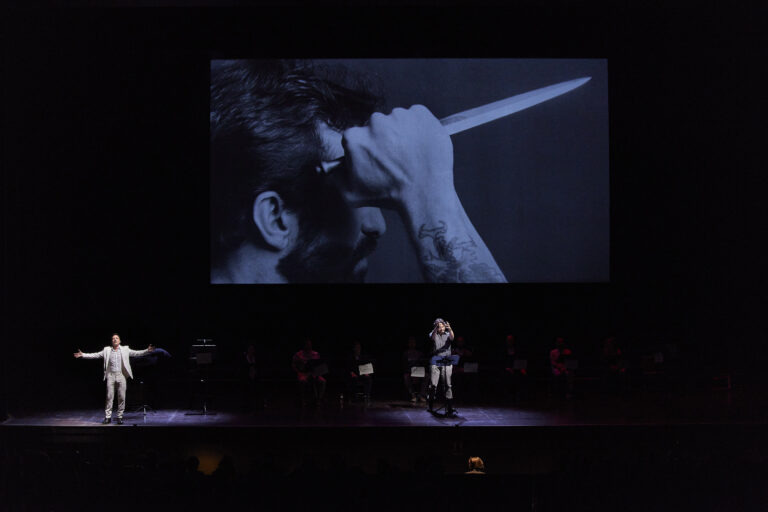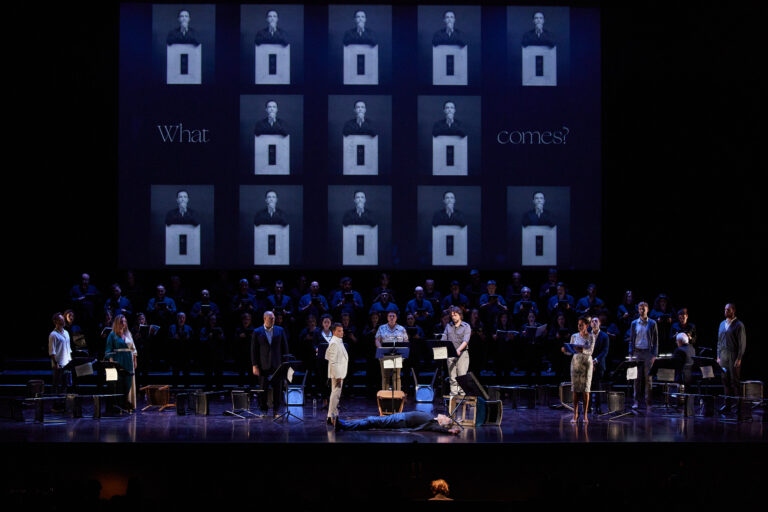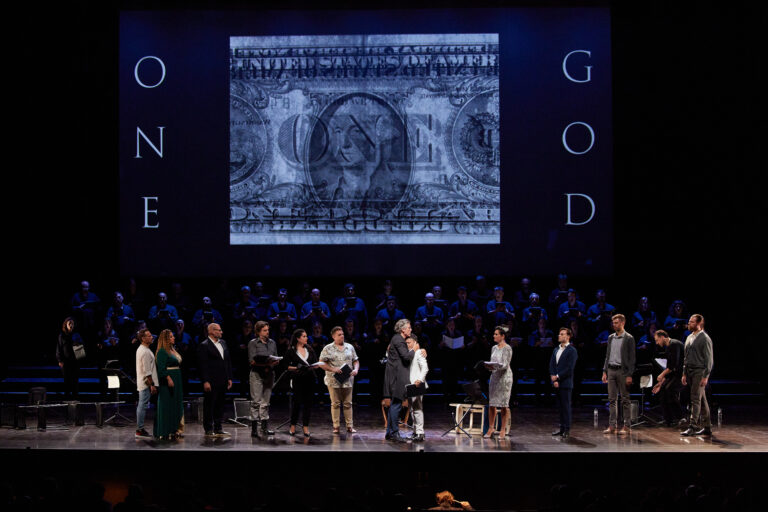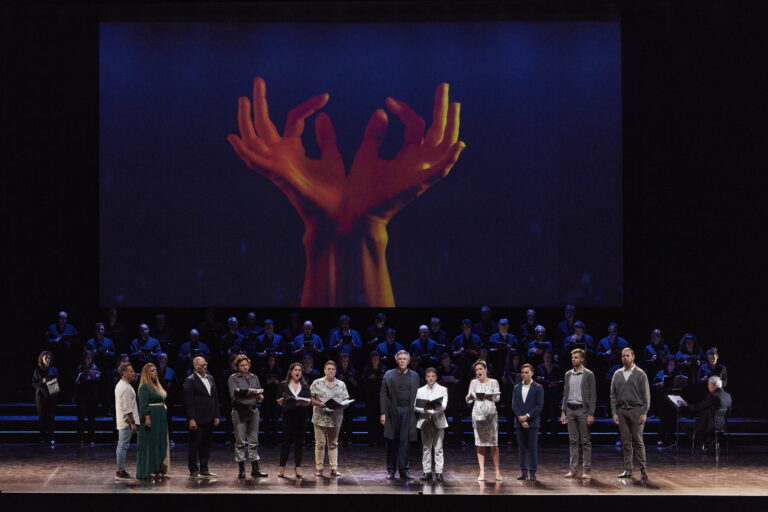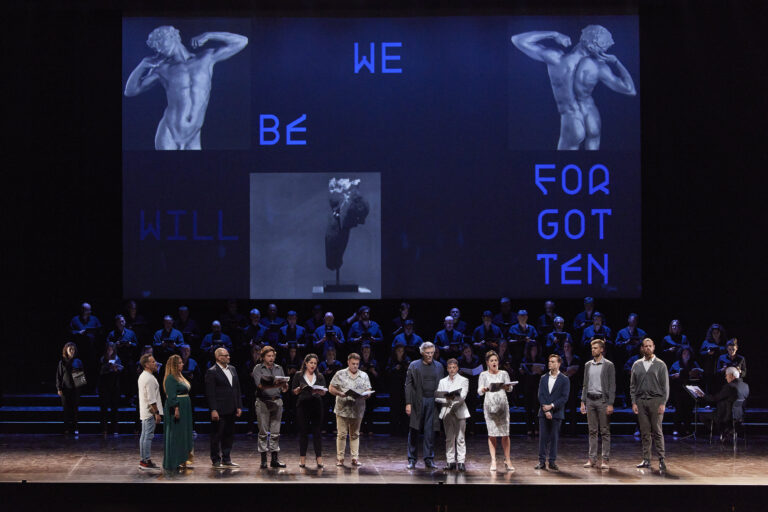
For more information and booking, please contact breakersmanagementcontact@gmail.com
Introduction to the Opera
(by Daniel MacIvor)
Hadrian creates the story of the last day of the Roman Emperor who ruled from 117-138 AD. Hadrian seems best known for the building of the wall in Britannia that bears his name, and for his conflict with Judea against rise of monotheism. But he is mostly unknown for what might be his greatest legacy, his having lived openly as a homosexual and his deep, unshakable love for another man, Antinous.
Homoerotic relationships were acceptable within the Roman nobility at the time but only when the aim was carnal instruction between an adult male and a youth who was a slave and subservient to his master. Antinous was both a free man and too old for this relationship to be sanctioned, and most concerningly for Hadrian’s entourage, Antinous was treated by Hadrian as an equal partner in their love.
Hadrian met Antinous in Greece while on a tour of the Empire and they spent the next six years together continuing that tour. Near the end of their travels, facing the happy the promise of a life together at Tibur, Hadrian’s magnificent villa outside Rome, Antinous died under suspicious circumstances by drowning in the Nile.
In our opera we offer explanation for Antinous’ death, and for Hadrian’s politics. We expose his bottomless grief and hold up Hadrian’s relationship with Antinous as one of greatest love stories of all time.
Act One – The Night of Hadrian’s Death
Act I begins in Tibur, Hadrian’s villa outside Rome. It is the last day of Hadrian’s life. Hadrian is gravely ill and still deeply grieving Antinous death. He is surrounded by his court, and pressured by his army’s commander, Quintis Marcius Turbo, all of whom anxiously wait for Hadrian’s return to command. The empire is unsettled, and a rebellion is brewing in Judea; where is their leader?
Partly evoked by grief and partly from fever, Hadrian is visited by two deities that only Hadrian can see and hear – Plotina the Empress who guided Hadrian to his throne, and her husband the Emperor Trajan who was a father figure to Hadrian. Plotina has come to insist that Hadrian, in his final moments, lift himself from his grief and deal with the encroaching threat of monotheism. It is Plotina’s fear that one God will erase all others and she will be forgotten. Trajan is more sympathetic to Hadrian’s broken heart and has come to protect Hadrian from Plotina’s strong hand. As the act unfolds and Hadrian continues to refuse to let go of his grief and his questioning of treachery around Antinous death, Plotina makes a deal with Hadrian. She will offer Hadrian access to the past and give him two nights with Antinous in exchange for action against Judea and the monotheistic threat. Hadrian will agree and allow us a journey back in time.
Act II – Seven Years Prior in a Grove in Greece
Act II takes us to the past and Greece. Hadrian recognizes the night immediately. It is the night Hadrian first met Antinous. Hadrian is aware of the fact that he is reliving an experience but is warned by Plotina he can do nothing to alter the past and its history.
As the act begins Hadrian’s entourage is on its tour of the Empire, and is welcomed to Greece and the festival of Robigalia – a harvest festival. There is much pomp and celebration, a sacrifice will be prepared. Here we meet for the first time Hadrian’s wife Sabina – a woman with a tender heart which has been made cold by inattention and we sense some bitterness, it is clear that the marriage of Sabina and Hadrian is a marriage in name only. A brilliant orator, Hadrian makes a speech that shows both his great love for Greece and his personal humility. This inspires his wife Sabina to remember her love for her husband and in a tender aria she entreats his attention. In this act we also again meet Turbo, Hadrian’s boyhood friend and the head of his military. Turbo has deep love for Hadrian and great concern for Hadrian’s legacy – and as a result Turbo tries to buffer Hadrian from what Turbo considers unwise choices. Later in the act Plotina pays a visit to the mortals in the guise of a Sybil who makes an ominous prediction about Antinous’ place in Hadrian’s world and his future. Hadrian ignores any dark warning and is swept up in his joy of spending these precious moments in the presence of his beloved. The act ends with Hadrian’s invitation to Antinous to join their journey and his life.
Act III – Six Years Later On A Barge in Egypt
Act III begins in a place out of time where we witness the love between Hadrian and Antinous that has matured into the complicit passion of soul mates. As the action resumes we see that six years have passed and the tour of the Empire has continued. The entourage fights against feeling faded and spent, all having grown tired of the party and all missing Rome. Antinous has proven to have become the light of their journey. He offers wisdom and insight and his company is welcomed and sought out. Antinous is a respectful and respected presence to all, other than to those concerned with the current political situation and most notably Turbo. Turbo is worried that Antinous has Hadrian’s heart and more concerningly his ear, in regard to stalling the war machine that Turbo and Rome’s military see as necessary to keep the Empire thriving. Hadrian is in ill health at this time and is distraught in two directions. He is despondent that he must relive this tragic night – and can do nothing about it – and weary that he is forced to feel the illness that has continued to plague him in the present. Plotina assures Hadrian that all will be worth it and he will welcome the truth finally known. Meanwhile Turbo has manipulated Sabina into taking part in a plan that will separate the lovers. She will play a Sibyl that will offer a prophecy that Hadrian’s health will return if Antinous sacrifice himself for Hadrian. But when in the guise of the Sibyl Sabina witnesses the love that the two men have for one another she comes to understand that Hadrian’s feeling for Antinous is not a rejection of her but a true-hearted love. Sabina tries to undo the deception but she is too late and Antinous meets an untimely end at the hands of fear and treachery.
Act IV – Returned to the Night of Hadrian’s Death
In Act IV we see Hadrian first crushed by knowledge of the truth, but then rising to action. He will enact a revenge that will be an undoing of both the Empire and Plotina’s wishes for eternal remembrance. He signs the edict to send troops into Judea, drawing Turbo into his chambers. Hadrian forces a confession of Turbo’s murder of Antinous. Turbo exclaims that it was all for Hadrian and his legacy, but Hadrian asserts that his legacy shall not be war, but that he loved. He dies, and rises to become a god next to Plotina, Trajan, Sabina and Antinous. As the gods stand about, pondering what is to become of them in the future, the chorus presses in on all sides, clearly divided. They are arguing about religion, and it has fractured the empire. To war, they cry, to war.
Composer Note
When I first read the fabulous Memoirs of Hadrian by Marguerite Yourcenar, a novel which inspired at least three generations of gay men, I was instantly struck with the idea of transforming this historical subject into operatic form. Both its intimate nature and wild grandeur seemed perfectly suited for what opera does best: creating a hyper-illustration of the dark inner lives of people up against formidable outer circumstances while at the same time musically careening through the surreal dimensions of what lies in between. In my opinion, no other theatrical form truly refracts life into myriad vibrantly bright colors as much as opera does and the tale of the Roman emperor Hadrian is a diamond perfectly cut for such a task.
In this new piece, I continue to follow my sincere love of long melodic lines mixed with rich orchestral textures, a pattern begun in my first opera Prima Donna. But whereas the rainbow refraction is occurring, it’s through a much darker and harsher lens. This story unfolds amidst the upper echelons of a brutal militaristic state and involves historical facts wrapped up in total speculation and surrounded by the supernatural. My Hadrian is a surreal romp through time and space, mixing true occurrences with complete fabrication in order to illustrate a vivid “creative snap shot” of the classical era.
The opera focuses on the emperor’s true but problematic love of the beautiful male youth Antinous. All the while, the dark specter of monotheism rises in the distance, heralded by the Jews and early Christians, which would ultimately destroy the lovers’ ancient pagan belief system. Historical research shows how huge tracts of Hadrian’s life and legacy were purposefully destroyed by vicious detractors – a tremendous tragedy, since judging by surviving accounts, he was a productive and just ruler. This, of course, is heavily complicated by his massacre of Jews, which cannot be forgotten, and is a major focal point of the opera, the results of which we are still confronting today.
His stabilizing of the Empire; his focus on philosophy, arts and architecture; his emphasis on diplomacy instead of brute force; and eventually his successful transfer of power. These achievements, as well as the dark stain of the massacre, would be better known and more deeply understood had it not been for Hadrian’s overt homosexuality. Almost immediately after Hadrian’s death, the patriarchal dictates of mankind took over the narrative, leaving the pathetic ancient observation that he “wept like a woman” when Antinous drowned to overshadow all his accomplishments.
I continue to explore the fascinating ideas which swirl around the subject of my second opera. But I am a composer, and therefore my armchair intellectual reach should be superseded by the music – music that I hope you enjoy.
Rufus Wainwright
January 4, 2018
Hadrian - canadian opera company
WAINWRIGHT / HADRIAN / MAPPLETHORPE
Two worlds seem to be ages and gigantic aesthetics apart. The world of opera, the world of Rufus Wainwright’s Hadrian and the world of photography and the world of Robert Mapplethorpe. But on closer look the crossroads between them, the connections of their themes, the subversion of classical forms through injection of a different form of
sexuality become evident. Looking at Mapplethorpe’s pictures, a pleasure despite their seemingly controversial nature that one can hardly evade, makes it obvious how surprising, subtle and brash they are able to accompany the story of an Emperor who
could have everything just not the one thing he really wanted. Who realized that his only legacy lied in the fact that he loved.
In a completely new interpretation of Rufus Wainwright’s opera Hadrian, rather than the performers, sets and full production realized in an opera house, Mapplethorpe’s images
in a special visual presentation are used to express the story and more importantly inner tensions and torments of the characters of this opera. It can be performed in a concert
setting indoors or outdoors. The concert setting here is not a practical solution but it is a radicalization and emotional and visual expansion of the dramatic nature of the opera
itself.
From Mapplethorpe to Rufus Wainwright’s Hadrian
From Physical Empires to the only lasting immateriality of love
Robert Mapplethorpe’s work is singular within the history of photography. He has opened up the medium to new territories, interrupting the entire visual world, while at the same time creating some of the most iconic and classical images in photography. He is a trailblazer and a perfectionist traditionalist at the same time. He clearly has been inspired by masters of photography that came before him such as Horst P. Horst but
also artists of a classical age such as Michelangelo, Praxiteles and others. He has the eye of a classically trained artist, of an artist of the classical era. Even Mapplethorpes themes are very classical. Love, death, desire, beauty, power are the building blocks of our emotional and sexual universe. They are at the same time the planets that revolve around the musical sun in the operatic universe. Music is our most intimate way of
expressing the immaterial nature of our emotions, the harness and the explosion at the same time. And in opera, the human voice becomes the carrier not only of meaning but of emotion, it is the most extrovert expression of the most introvert human state possible. Opera is not about knowledge, about right or wrong, about progress, or learning but it is about suffering, torment, about realizing what is the one and only thing
worth dying for. Mapplethorpe expresses these fundamental emotional states of our human existence with what is in front of his eyes through his unapologetical homosexual gaze. The classical materials of marble and paint are augmented and replaced by gelatin and leather. “I see things like they’;ve never been seen before“ Mapplethorpe says. His images from the homosexual underworld have brought him the largest notoriety and have probabky overshadowed for some time the reception of his entire body of work. They are only a small fraction of his art. Yet even his most pornographic images have the composition, tension, strength, balance and calmness of classical sculpture. They are still and yet contain movement and most importantly story. They are theatrical as they are staged. In classical Greek sculpture masculinity was desexualized. It was brought into balance somehow with the feminine. The ideal body was that of the youth, the small penises, the clean shaven skin symbolized the Apollonian ideal. Mapplethorpe unleashes the male sexuality and in particular the penis but stays within a classical overall composition. His most iconic models such as … are equally shaven and and physically somewhat ambiguous. He is no Tom of Finnland who exaggerated every manifestation of masculinity to an extreme or went for ultra- masculine models. What makes his images so incredibly explosive is that he clearly stayed within a classical context within a narrative and investigation of and obsession with the human form that goes back generations of artists but everything seems to be infused with such new blood and other bodily fluids. And nobody before him has been able to create still lives of flowers that are more erotic, more physical than Mapplethorpe. His images of flowers exude sexuality. They are almost as obscene as his most overtly homosexual images yet they are merely stems, petals and leaves. But they are almost more than the marble, the skin, the leather of his other images. And this is where one just has to realize that there is nothing pornographic about any of Mapplethorpe’s even seemingly most pornographic images, because their purpose is not arousal. The fascination of pornographic images dies with the prolonged gaze of the viewer. Not so with Mapplethorpe. The fascination of his images does not diminish the more you look at them but it grows and accumulates.
If he can make two flowers look like they have sex, his fisting images, or images of penises are just as much about the human condition, about who we are at the deepest level of the natural world. “Beauty and the Devil are the same thing” Mapplethorpe said. There is almost without doubt no artist in the world who would disagree with him. Neither Mapplethorpe nor Wainwright try to hide in any shape or form the homosexuality from their work. They both approach it head on, without prejudice, without shame, without reservation and therefore upon deeper inspection their work goes way beyond it. It is like a bullet, it is so fast, you don’t even realize it hit you. And then you realize that it actually does not kill you, but that it is in us, in all of us.
“When I have sex with someone I forget who I am. For a minute I even forget I’m
human. It’s the same thing when I’m behind a camera. I forget I exist.” What
Mapplethorpe seems to say here is that in the sexual act we become a creator, just as
much as an artist becomes a creator. Everything else is no longer important. At the end
of Rufus Wainwright’s opera
“I need no star.
I need no star.
And should his statues crumble I need no stone I need no star
No stone, no star
No stone, no star
Can one possess a breath, the very air?
I have lived
And soon to die
Will see my love again I need no star
Antinous shall be the air Antinous shall be love. And the gods shall be forgotten.”
And then just before he dies: “In one way was I true.
One way to be remembered. This final breath, my legacy:
He loved.”
Love is the only thing that remains, and at the same time it is the only thing that cannot be owned. In love we forget our existence. In statues, in walls, in palaces, we manifest our existence but the moment that we long for is to forget that we exist, it is in the act of making love and in the creative act for Mapplethorpe. All his images as he says come from that act of forgetting that he exists. They all come from a point of view of love, of making love. “Just because I was out at the bars all the time, didn’t mean I wasn’t looking for someone to love.” Mapplethorpe said. What Hadrian realizes at the end of his life, Mapplethorpe knows is at the beginning of his creative expression.
Rufus Wainwright’s Hadrian as a Conceptual Evolution of Opera
Rufus Wainwright’s Hadrian is a profound, complex and compelling piece of operatic theater, full of rich characters that all undergo deep and moving changes throughout the piece. It is written in the operatic tradition of the great 19th and early 20th century when opera was the truly popular musical art form when people sang operatic tunes on the streets. Contemporary opera leaves a lot of traditional opera lovers cold as often musical languages of the composers are too removed from people’s tastes and daily experience. Popular music today is still based on harmony and melody but very few contemporary operas are. “Hadrian” attempts to revive and reconnect opera to a time where it was more popular, to offer a new perspective onto contemporary opera and tell a new story to a contemporary audience but use melody, harmony, deep emotions, arias, ensemble scenes. But at the same time Wainwright infuses the musical world of Hadrian with his very own distinctly “Rufus-Wainwrightian” sound and melodies that are instantly recognizable.
There is no doubt that this is a highly original and independent piece and sound. In a strange way one could argue it is even more contemporary than many of the operas written today as it is a deeply conceptual piece at the same time. While Wainwright approach to opera might be traditional in the way that he continues to believe in the power of story and emotion and opera as a “generator of emotions” his choice of subject and story makes it highly contemporary. Opera has been traditionally about the greatest and deepest love stories made impossible by society, class, intrigue, politics, war etc. It was always interested how the exterior world impacts the interior world and the love between two people is at its core as it is the most powerful and at the same time fragile and painful emotional mechanism we have, and probably the most human. Or as George Bernhard Shaw said “Opera is when a tenor and soprano want to make love, but are prevented from doing so by a baritone.”
All love stories of the great historical repertoire are straight. “Tristan and Isolde”, Mimi
and Rodolfo, Pelléas et Melisande, Tosca and Cavaradossi. Rufus replaces that core
theme of opera, that doctrine of our emotional existence and definition of who we are as
loving human beings, loving the opposite sex, with a homosexual love story. He raises
same sex love onto the same plinth as the great heterosexual love stories, giving it the
same care, attention and thus grand opera approach. Homosexual love has been
banned, ridiculed, forbidden, chastised, persecuted, killed for centuries and even today is still not seen as equal to heterosexual love.
African American painter Kehinde Wiley is celebrated for taking iconic heroic European paintings of Gods and Goddesses, royals, heroes and replacing their white clientele with black characters. He is not called a traditionalist, a plagiator, he is called a visionary, a renewer, a revolutionary. What Rufus does in Hadrian is exactly the same process. It might be more modern speaks more of today than what a lot of contemporary composers do trying to hold onto a language of avantgarde and musical progress for progress’ sake that a wider audience does not find appealing in a lot of cases. What is possible in painting should be possible in opera and music. Few contemporary operas sell out large opera houses. Hadrian did. And the reason is that at its core it is not a homosexual story, it is a story about love but by widening the definition of what love is, it actually is more inclusive, more universal than the normal heteronormative narrative.
Gay people have been the audience and fiercest supporters of opera over centuries but they have never seen themselves, their stories and their love, reflected on the stage. Hadrian changes that radically, without any shame but at the same time also without any sense of confrontation or accusation. This is not a story that points fingers or shames people for not respecting homosexual love but talks about initially not seeing love in homosexuality but then realizing it is the same thing. Audiences in Toronto straight or gay were riveted by the story, by the depth of love between the main characters. Any initial critic or conservative traditionalist could see themselves reflected in Hadrian’s wife Sabina. She thought Hadrian incapable of love, because he did not love her. But then we would follow Sabina in act three realizing that it is love between Hadrian and Antinous and it is real, fundamental, and absolutely equal to heterosexual love. Her eyes are opened and therefore probably the last straight fundamentalist set of eyes as well. This is the achievement of Wainwright’s and Daniel MacIvor’s (the congenial librettist) opera. For every attitude towards the subject matter there is a character in which the audience can see themselves reflected but they all undergo a change and eye opening (or love opening) process.
Of course composer and librettist were assisted by great singers in their portrayal of their complex characters. In particular Thomas Hampson, a straight man, said over and over again that he wants nothing more than to make Hadrian’s love for Antinous believable. When an audience member shouted bravo after the sex scene of the third act overture Thomas Hampson could be seen smiling contently on stage, proud about having brought across his characters intimate attraction to another man. Of course that audience member not only applauded Thomas and Isaiah Bell (Antinous) for their believable and beautiful portrayal of the attraction of two men in an opera, but also the fact that seeing this love on an opera stage was really a complete novelty that finally came decades after gay characters made it into contemporary popular culture on a major operatic stage. But even in popular culture often gay people are portrayed as eccentrics, sidekicks, tormented characters. There is always a problem with their love. Brokeback Mountain was the first mainstream movie with a gay love story at its center but it still falls into the tormented-coming-out-closeted-story category which Oscar nominated Moonlight does as well. Why can a general audience only deal with homosexuality if it is somehow connected to pain? It is only as recently as “Call me by your name” that a film about homosexual love is getting rid of the shackles of seeing homosexuality from the perspective of the closet. “Call me by your Name” is about the discovery of first love’s purity. Hadrian is unapologetic in the exact same way. A gentleman from San Francisco in his 50s wept after a performance saying how he was reminded of what the gay community went through with AIDS in the 8Os when he saw Antinous taking care of the sick Hadrian in Act 3 moments before he was killed himself and thrown into the Nile. Where does opera deal metaphorically on a deeply emotional level with such contemporary issues? Hadrian is full of timelessness and they are so much more poignant because the essence of the story is so radically different and new. A lot of operas are drowning in their own cliché. Hadrian is escaping that as it discovered a radically new interpretation and expression of opera’s core themes. One could go on about the incredibly well constructed drama of the piece that keeps you engaged from the first minute as the audience immediately becomes complicit in Hadrian’s desire to find out what truly happened to Antinous. Was it murder, was it sacrifice? It is also a crime story, a whodunnit.
Thomas Hampson said that most people don’t understand that opera unlike theater is not about story and moving the drama forward but both are a vehicle to arrive at torment and the expression of a moment, a tormenting feeling. Wainwright fully understands that with Hadrian. He constructs moments where time seems to stand still and the characters plunge into their inner worlds and express them. Plotina’s and Sabina’s aria, the love duo that turns into a trio in act 3, the overture of the third act are all explorations of the deepest human feelings where the outer reality and time come to a halt, where characters are brought through story and drama into a situation of the greatest torment that only opera can truly emotionally unfold. And talking about singing operatic tunes on the streets, you can actually walk out of Hadrian whistling or hearing in your inner ear Sabina’s gorgeous revelatory line “He loves, he loves” from the act three love trio? Hadrian is a mature work of art, one that has an incredibly compelling story that you follow with rapture like a crime story, incredibly complex characters that all go through deep and profound and moving changes that leave them transformed. Paraphrasing George Bernhard Shaw, Hadrian is more than the tenor wanting to make love with the baritone and the soprano trying to stop them. It is a tiny yet epic reshuffling of the fundamental love triangle. Hadrian is also about one of the greatest and most significant shifts in our culture and politics: the end of the classical era and its polytheistic world order that created an incredible blossoming of the arts and gave birth to democracy followed by the dawn of monotheism laying the foundation for bitter religiously motivated ideological warfare and suppression of human focused philosophy, knowledge, art and science. Certainly an expression of this shift (or attempt to prevent it by Hadrian, Trajan and Plotina) and the most bitter aspect of Hadrian’s legacy is his signing of a decree killing hundreds of thousands of Jewish Judeans. It is an integral part of the piece as Plotina uses it as a bargaining chip to grant Hadrian’s wish of revisiting the day he met Antinous and the day he died in order to finally understand how his lover died. And yet Wainwright’s opera says so much more about this horrific legacy of Hadrian’s. He clearly regrets what he was forced to do (we don’t know whether the historic Hadrian did as well of course) and knows that history cannot be stopped by killing people (another one of these incredibly modern parallels, and yes of course, because Hadrian did lay the seed for the middle Eastern conflict that we still have to deal with today).
Antinous’ aria in act 3 which is his “Sermon on the Mount” is as compellingly pacifist as any of the great historic speeches on the subject of respect and love of the foreigner can be. At the end of his life and the end of the opera Hadrian realizes that history cannot be stopped and monotheism will rise even if he is trying to prevent it. He realizes that his decree is hateful and yet he had to fulfill his side of the bargain to Plotina. He realizes that it will destroy his legacy, his greatest achievements such as the Pantheon, the Empire, Order and everything he ever stood for. But then moments before his death, he realizes that his true legacy will be love and the fact that he loved. That is what we all hope for. To leave this planet having truly loved. Hadrian does.
But ironically it is not the genocide of the Judeans that eradicated his legacy, most people do not even know this about Hadrian but the only thing they know about him is Hadrian’s wall, but the very thing that Wainwright defines as his true legacy: Love, and more precisely love of another man is what eradicated him from the history books. This love, this gay love is actually why we know so little about Hadrian. His legacy was destroyed, records were destroyed because his love was deemed improper and unnatural. It was regarded as degenerate, as weak, as female. Hadrian cried like a woman apparently after Antinous died and that was regarded as ultimate weakness, not the crying part, but crying like a woman. Rufus and Daniel have resurrected this love, they have rewritten it into the history books. Love is the strongest and the weakest element of our existence at the same time. Strength is not male or female, weakness not female or male, it is human. They have put this love back on the plinth where it belongs for everyone, human, homosexual, heterosexual, non-binary alike to be moved and touched by.
Jörn Weisbrodt


